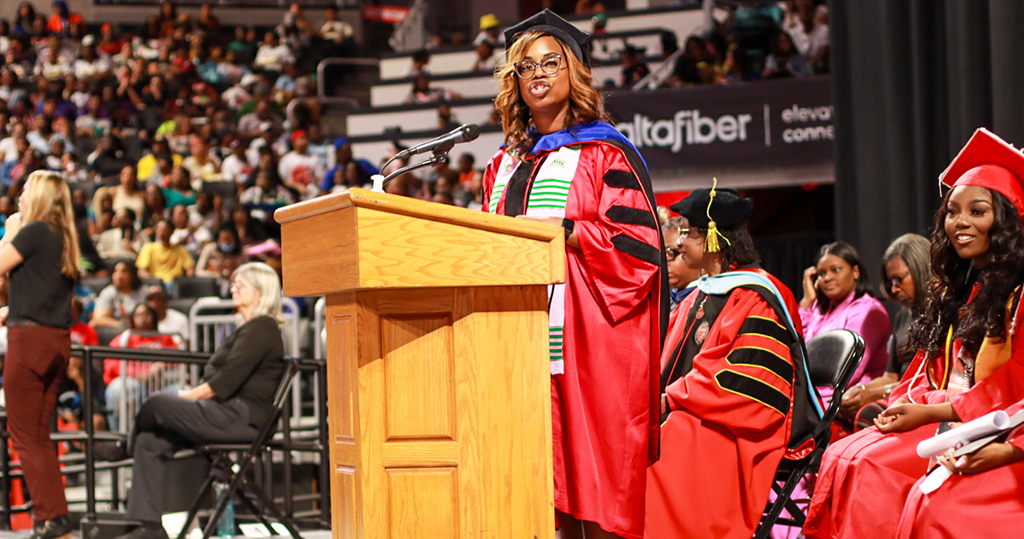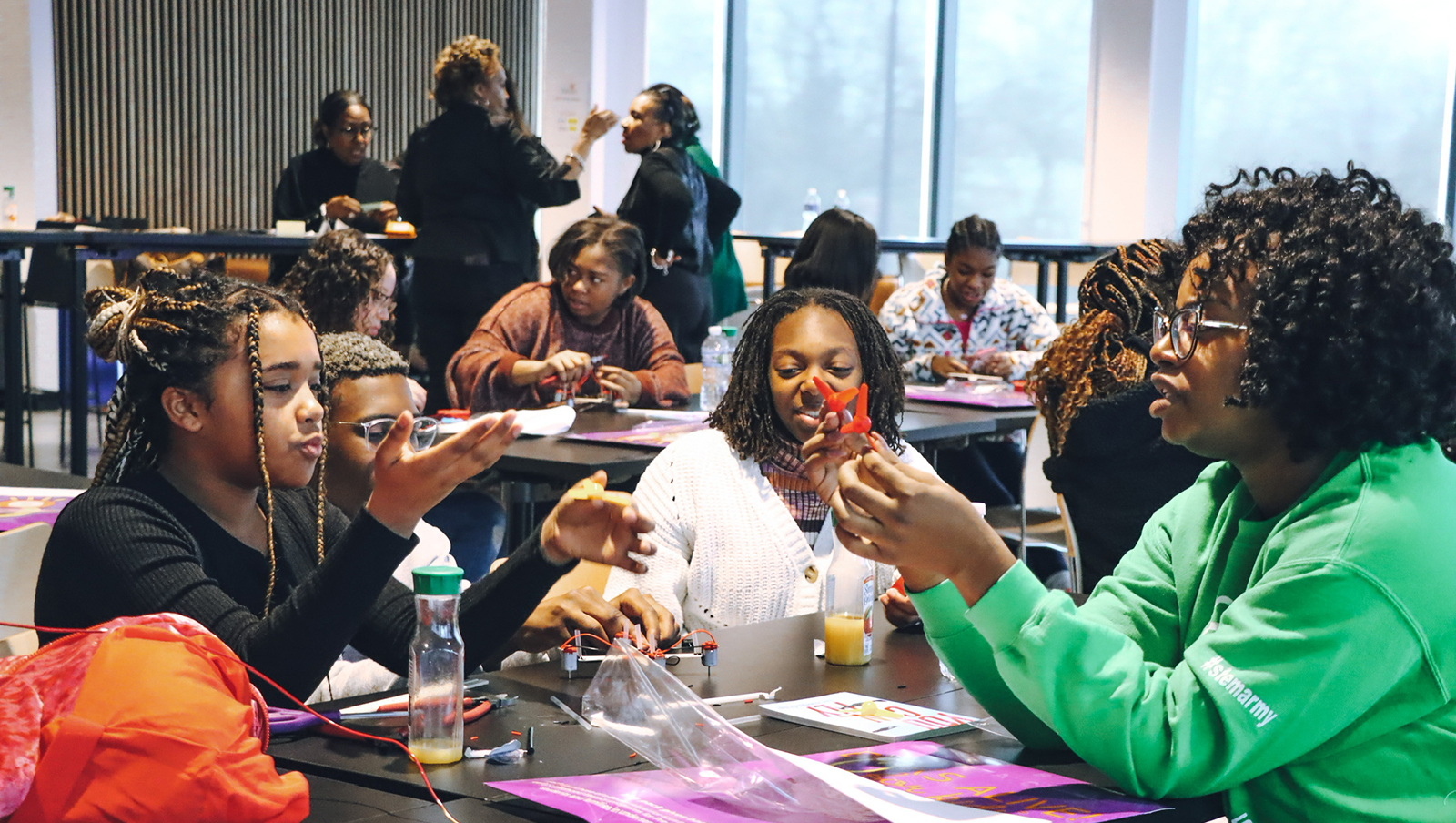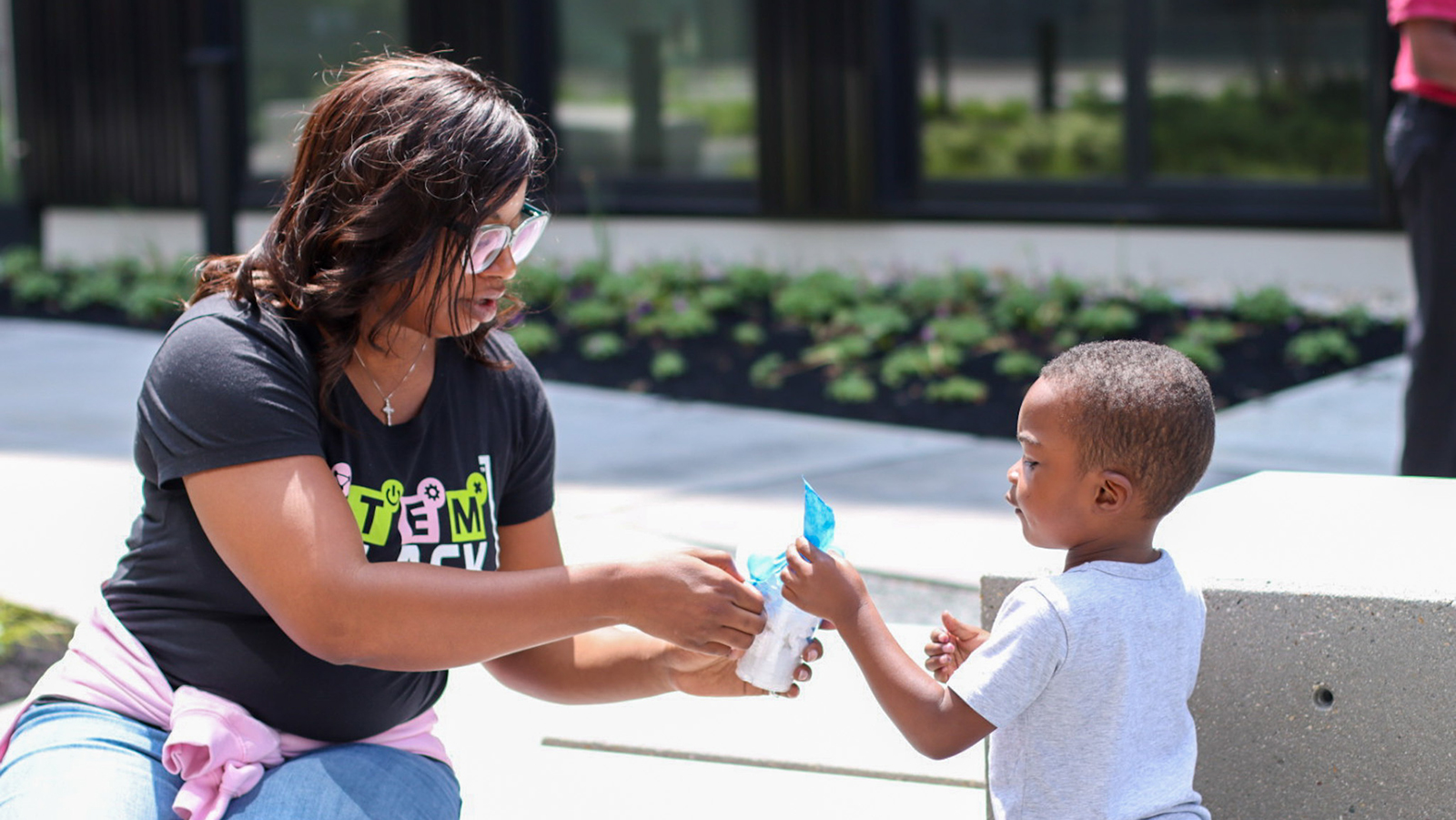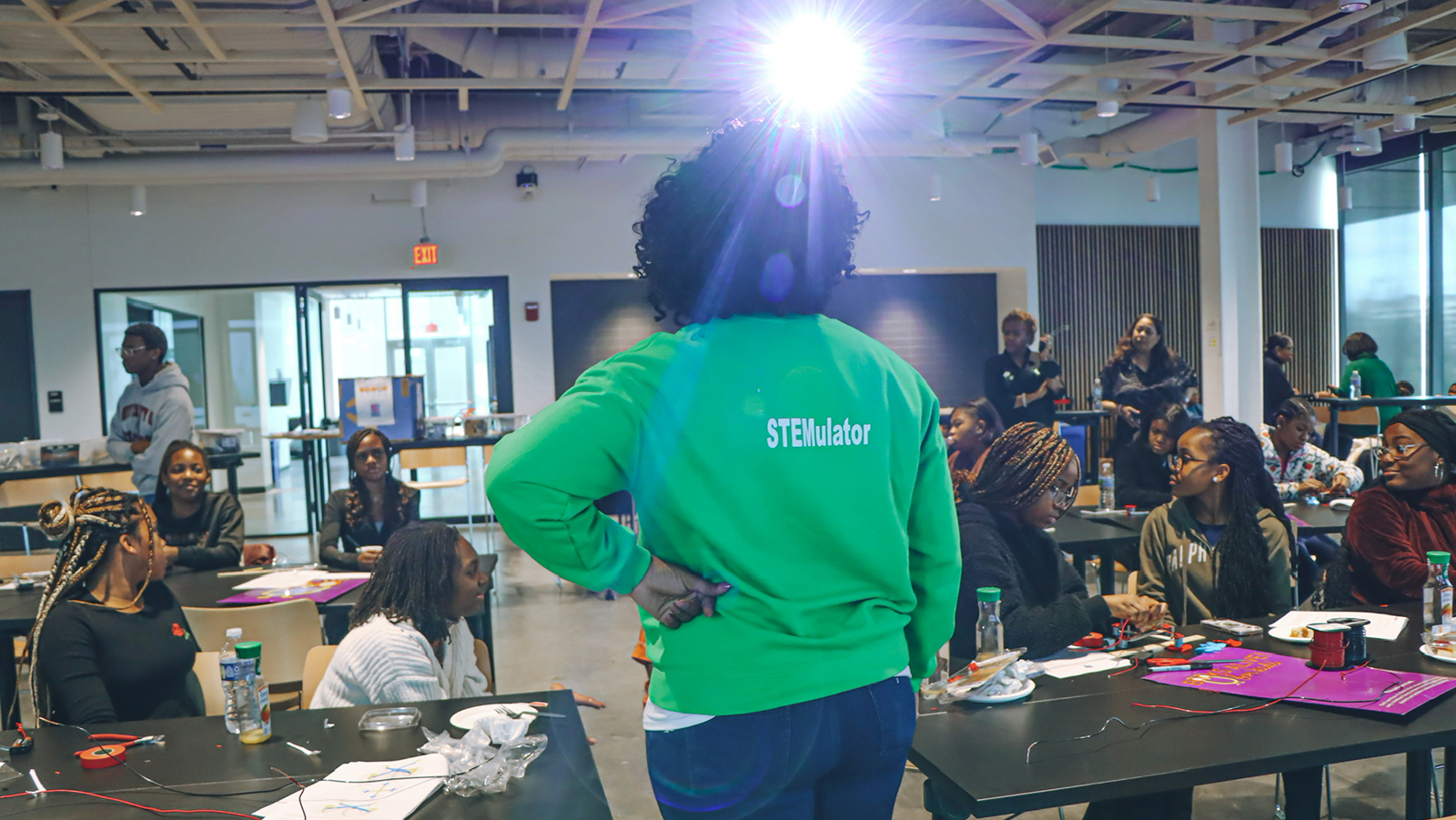
Interview: Whitney Gaskins from the Gaskins Foundation
A church may not be the first place that comes to mind when thinking about where to engage with science. But for Whitney Gaskins, churches are at the center of her work connecting people with math and science. Her organization, the Gaskins Foundation, connects community churches with STEM engagement opportunities through their program Empowering Parents in Community Churches (EPICC) STEMulation. Gaskins says she’s excited about the upcoming total solar eclipse on April 8, 2024, seeing it as an incredible opportunity to go even further with her work.
With the eclipse right around the corner, Gaskins and EPICC are seizing this cosmic opportunity to work with parents to prepare them and their families. She’s also helping parents become STEM advocates and role models in their communities.
We recently spoke with Gaskins about her work. The transcript below has been edited for clarity.
Hi, Whitney! Can you tell us more about yourself?
I’m the founder of the Gaskins Foundation and a faculty member at the University of Cincinnati, where I work as an assistant dean and assistant professor of the Office of Inclusive Excellence & Community Engagement. At the Gaskins Foundation, we do so much work and outreach to help communities have access to STEM. I’m excited about how our work has been able to integrate STEM education into informal spaces, such as churches and community centers.
What’s your favorite memory of the sun?
I remember when an eclipse happened in Mansfield, Ohio, when I was in elementary school. It was a collective experience — everybody in my town was outside looking at this eclipse. I don’t think I knew how big of a deal it was, but it felt awesome. When people tell you the whole world gets quiet, it really does. I remember that we were all just kind of in awe. After that experience, my dad even bought a telescope because I think he thought, “This is really cool, and we should keep fostering this curiosity.” We would set up the telescope to look at the moon. It turned us into a more space-curious family.

What has your relationship with science been throughout your life? How did that bring you to where you are now?
I have always been a curious person and wondered how things work or why things are the way they are. I grew up in the country, which gives you a totally different view of what science could look like, especially when you think of subjects like zoology or ecology. We didn’t use those words, but I’ve always been science-curious. I also had an amazing family that was into science too. We would learn and explore together. That’s probably why I’m so passionate about outreach now. I want to make sure other kids have that opportunity. You don’t have to be an engineer like me. You might really be into animals or biology, so let’s help you figure out what that looks like.
Can you tell us more about the work of the Gaskins Foundation?
The Gaskins Foundation really came about because I was Miss Black Ohio in 2009, and it was my platform to get more diversity into STEM spaces. I didn’t have that language then, but I was tired of going to class and being the only one that looked like me in a classroom. So I said, “Well, let me see if I can help kids understand that this is a space for them.” I would tour the state of Ohio, doing workshops at elementary and middle schools to help kids have a fun interactive experience with science. And then that work continued into what the Gaskins Foundation is today.
How did the Gaskins Foundation and EPICC’s focus become churches?
After a conversation with my board, I realized that some of my first formative science experiences came from church, and we fostered our curiosity around science together as a church family. So I just remember saying, “Well, why don’t we do that? Instead of trying to do these after-school or Saturday programs, where we know there’s a high attrition rate, why don’t we bring our programs to churches? But let’s not be the people doing it. Let’s just empower the parents to do it, because if they can do it, then we don’t have to have a scientist or an engineer. It will help them continue teaching their children, which helps with role modeling and a bunch of other things.”
So that’s how our EPICC program started. It stands for Empowering Parents in Community Churches, and it’s been going tremendously well because, again, it’s owned and developed by parents. They develop and deliver the content, and we’re there to infuse the STEM information, so that way they are teaching the actual science and developing what they want their kids to do. That’s how we’re empowering them. We’re helping them feel like they can talk to their children about how the world works, which is huge, because now kids can see their parents as well-informed citizens and STEM advocates. The parents might not be STEM professionals or see themselves that way, but it helps the kids with that role modeling, and then it helps that family unit, because when you help the whole family, you help put everybody in a better place.
What is it about churches as a community space for viewing the eclipse that is interesting to you?
There’s something beautiful that happens in the eclipse that helps people connect a little bit more with their faith in that moment. One, because there’s a recognition of there being so much more to the world than we will ever be able to understand in any of our lifetimes, and I think that that revelation comes out even more with the eclipse. We’re in this solar experience, and we get to share it together. It’s a moment to connect with your faith and remember how much larger the world and the universe actually are, and I think that’s beautiful. I think we can do that through both recognizing our faith and then also recognizing science, which a lot of people think are in conflict. But I feel like this is one of those moments where there’s an opportunity to show how they can work together.

How are you preparing parents for the eclipse?
One way is that I was inspired by the eclipse, so I wrote a children’s book about it called The Great American Eclipse. I’ve been passing that out to families so that they can communicate what the eclipse is to their children. It was really an inspiration of how you should be able to talk to your children about what’s happening in the world, because it is such a big deal, and I wanted other people to have a way to do that. I also wanted the characters to be of color, so I wanted some representation as well so that it felt like they are also a part of having this shared experience with the rest of the country. But the bigger piece is that people didn’t really know about the eclipse, so we’ve been spreading that information and knowledge and telling them, “Hey, guys, there’s an eclipse happening on April 8, 2024.”
We’ve also been doing quite a few different exercises to talk about what an eclipse is. We’ve distributed lunar maps and are teaching parents about space in general. It’s not necessarily like EPICC — it wasn’t because of a parent that was like, “I want to see this as STEM.” But we were able to plant the seed, and people are excited because it’s a once-in-a-lifetime experience. It’s going to be across the entire United States, and so our church families are excited to have this shared experience.
What else will the Gaskins Foundation be doing for the eclipse?
We have a relationship in Indianapolis with the Minority Engineering Program of Indianapolis (MEPI), and they don’t operate in churches. So we worked with the president of MEPI, Holli Harrington, and we are going to work with her home church in Indianapolis. But then, oddly enough, another church in Fort Wayne, Indiana, heard about our project, and so they’re coming down from their part of Indiana to our convening. Then we’re bringing people from Cincinnati as well. We also have a meeting with our churches in Columbus that are a part of EPICC, and now they’re like, “Well, we kind of want to come too.” It’s not that we’ve intentionally developed an entire community around EPICC — all these churches that are into doing STEM at their church are going to come together to share this moment. We’re excited about that, because it wasn’t intentional. The intentionality was MEPI and connecting with the church in Indianapolis, but then it turned into all those people are like, “Well, we want to do it too.” And so now we’re all doing it together.
And what is April 8 going to look like for you personally?
I think that because we’re bringing families together, it’s going to be a very loving comfortable environment. I’m going to be holding my daughter. I just want to have this shared experience with my family — both my immediate family and my church-community family.
I’ve also read my book to my son. He’s 4, and so for him to actually get to see what we’ve been reading and talking about — I just think it’s going to be beautiful. I get emotional when I think about it, because that day is a moment in time that we can share together that, hopefully, one day, he might be like, “I remember when I went to Indianapolis with my family, and we went to this church with my aunties and uncles, and my mom, my dad and my sister. And we experienced a total solar eclipse together.” I’m hoping that I’m building a memory for him — and me, because when I’m older, I can look back at when I took my kids to Indianapolis to see a solar eclipse. All of it is a shared memory and a loving experience.

Are you and the EPICC team thinking about the aftermath of the big day?
I’m hoping that because we will have such a beautiful memory that we shared together, the good word is spread and even more parents will start embracing EPICC and realize that while it might not always be an eclipse, there are other ways that you can have these shared experiences with science. Especially when they think about what’s going on in the world around them, I hope that they work with us to develop more content and excitement around what’s happening in their everyday life. I have a feeling that when our church community starts talking about what they did and what they experienced, even more people will think, “I kind of want to do that too.” And hopefully that’s what happens.
What advice do you have for people also organizing around the eclipse?
Keep it up. Don’t give up. We fail a lot, right? I try to tell people that what they get to see is the highlight reel, but there’s lots of times where I probably need to create a failure reel. There are times when it just feels like you’re not going to be able to overcome an obstacle. Just keep going. Stay consistent, be nimble, be adaptable and listen to your communities because they know what they want, so don’t try to speak for them or plan for them in a way that’s yours. Listen to your community, and that’s how you have strong partnerships.
Thanks for joining us, Whitney!
Thank you!